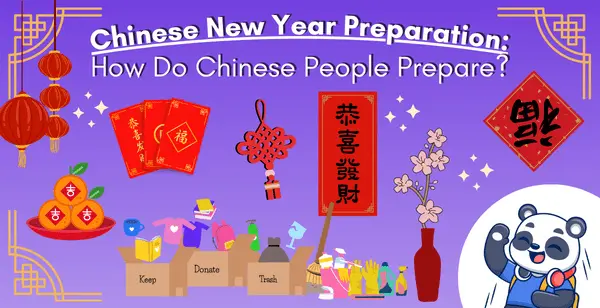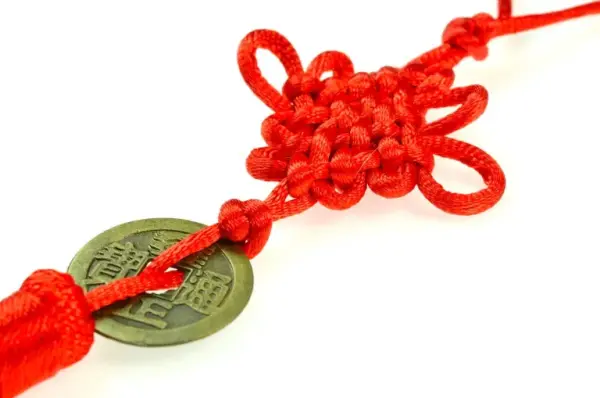
Chinese New Year Preparation: How Do Chinese People Prepare?
The new year passed days ago, but the Chinese New Year, one of the biggest Chinese festivals, is yet to come. Chinese people often spend quite a lot of time, say 16 days from Chinese New Year’s Eve to the Lantern Festival celebrating this event since Chinese New Year is a major event that marks a new start.
Chinese New Year party preparation is very important for this holiday. If you live in China or near any Chinese community, you can see Chinese people cleaning up, shopping for new clothes, and decorating their houses. There’s a lot to do before the Lunar New Year as Chinese people have a variety of customs to follow. In today’s article, we’ll discover how Chinese people prepare for their biggest national holiday.
Chinese New Year clean up
Cleaning up the house is a long-observed Chinese New Year tradition. “Out with the old, in with the new” that’s how you can prepare for the lunar new year.
In China, people use the term 扫年 sǎo nián, which is literally translated to “sweep away the year,” to refer to the house cleaning-up. But the meaning behind the 扫年 sǎo nián practice goes beyond such activities as polishing the floor, repairing or discarding broken items, or decluttering the home. You can also think of this meaning as welcoming the new year.
In Chinese, 塵 chén (dust) is pronounced exactly the same as 陈 chén (old). That explains why Chinese people are eager to tackle spring cleaning chores to sweep away not only the dust but also the bad luck and misfortune of the past year. At the same time, it opens space for all the new, good luck to enter and infuse your life.
If you’re having just a bad year, give “cleaning up the house” a try. It may wash away bad luck and bring in good fortune for you. Need some tips on where and how? Watch this quick video below that will help you out
Lunar New Year house cleaning tips | HCK GroupChinese New Year shopping
After giving your house a new breath of fresh air, it’s time to go shopping for a new start. Chinese people will shop for new clothes, food, and gifts for relatives. Also, they will need decorations for the Chinese New Year Festival
Lunar New Year items to know about | Clara's FSCHere are some must-buy items and symbols for Chinese New Year:
Home supplies
-
Oranges and tangerines (symbolize luck and success)
Pineapples (associated with money-making endeavors)
Kumquat tree (embodies good fortune and blessings)
Flowering plants (express wealth and prosperity)
Tea (Chinese people love tea! More to the point, Chinese fondness of tea is more a spiritual demand than a physical one.)
Red envelopes (a traditional new year gift for children or elderly people)
-
Decorations:
Chinese couplets
Paper cuttings
Lanterns
Chinese knots
The spring festival is one of the biggest sale seasons of the year. During this time, retail stores and e-commerce shops give out to their customers dozens of deals as a way to boost sales. As a result, Chinese consumers open up their wallets and spend big on shopping. According to Statista, the average expenses for the Spring Festival range between 500 and 2000 yuan (approximately $80 – $315). But there’s also a large population who pay higher between 2000 and 5000 yuan (equivalent to $315 – $780).
Chinese New Year decorations for the house
What’s next after a shopping craze? It’s time to roll up your sleeves, unload your shopping stuff, and start decorating.
1. Door couplets

Couplets carry messages of prosperity, good fortune, and good health are typically pasted on the main entrance door to your house. The couplets include two vertical scrolls on two sides and a horizontal scroll on the top.
The custom of pasting Spring Festival couplets traced back over 1,000 years to the Later Shu Dynasty (934 – 965). The original form of modern couplets was called “Taofu,” a piece of peach wood protecting against evil without having any script on it. It was not until the Song Dynasty (960 – 1279) that the wood board was replaced by paper, and people started to write wishes on it.
2. The “Fu” character

The character 福 Fu (blessing or good fortune) is used to express people’s yearning for a happy life, as well as wishes for a better future. Given that, Chinese people often paste this character on the gates or some furniture in the house during the Chinese New Year.
But instead of pasting the “Fu” upright, Chinese people hang it upside down. And this practice is widely accepted among Chinese people. One explanation is that the character for “upside-down” 倒 dào, is a homonym of the character for “to arrive,” 到 dào. In other words, when 福 Fu is placed upside down, it means the happiness or fortune is arriving.
3. Chinese knots

Another ornament that is used for house decoration during the Chinese New Year is Chinese knots. Chinese knots are believed to be a good luck charm; therefore, Chinese people often hang them around their house to attract good luck.
Though Chinese knots can be weaved using different colors such as gold, green, blue, or black, red is the most common and popular color. As we know, red is very important color symbol in Chinese culture, because it symbolizes fortune and wealth. As a result, Chinese people prefer red knots for special occasions rather than knots coming in other colors.
4. Door gods picture
The Chinese traditional religion is polytheistic, and Chinese people tend to believe that gods invisibly live among humans. As a result, Chinese people have many gods to worship to protect them from evil, bring them more luck, or even grant them well-lived lives.
In Taoism and ancient folk customs, the Gods of the Door are among the most popular gods. Chinese people believe that the Door gods live in the doors of every family, protecting their homes and preventing ghosts and evil spirits from entering their homes. During the Spring Festival, Chinese people often paste new portraits of Door Gods, indicating the changing of new clothes for the Door Gods in the new year and showing their gratitude to them.
Frequently asked questions
How can I celebrate Chinese New Year at home?
After preparing for Chinese New Year, now you have many options. You can gather with friends and family to welcome in the new year, make or eat traditional food, or enjoy the festivities with music and dances.
What are the Chinese New Year cleansing rituals?
Some ways to prepare for Chinese New Year is to cleanse and declutter the house, though most will clean the house by sweeping the floors and dusting items to brush away old luck and bring new luck.
The bottom line
As you’ve seen, Chinese New Year preparation is crucial before celebrating this festive holiday.
With a long list of traditions and customs, it’s no surprise that Chinese people have to go through many steps to prepare for the Chinese New Year. From cleaning to shopping and decorating, every task takes up time and true dedication. But it’ll pay off eventually with fortunes and blessings.
The easiest way to learn Chinese & build vocabulary

